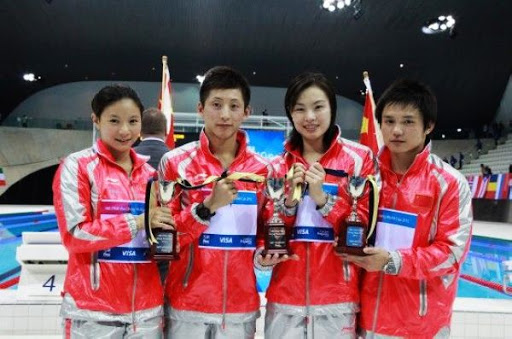Why China Produces the Most Olympic Diving Champions

October 23, 2020
Although not very well-known compared to other sports, diving requires extreme body strength and awareness, as well as the utmost amount of mental and emotional control. In past Olympic Games, the gold, silver, and bronze podiums were almost always awarded to divers representing the People’s Republic of China. Why is it that China never fails to produce athletes that dominate these diving events? What makes the diving training regimens of this particular country so much more rewarding than others?
“From ages as young as four and five,” Debi Edward, ITV News Correspondent, reported that Chinese “children are put through grueling regimented training routines designed to make them Olympic champions.”
Coaches first review thousands of kids during selection processes looking for a specific set of traits that are deemed to have “potential” to help the athlete reach stardom. In sports boarding schools, they are then required to either complete tasks involving incredibly difficult physical demands or get kicked out from the school. From the best of these boarding schools, divers are repeatedly trained to learn increasingly difficult dives until their moves reach perfection or to the point where they cannot physically push their bodies any further.
Along the way, coaches implement methods that have been “condemned as archaic and cruel,” reported Edward, but are apparently effective. A few are: forcing the athletes holding handstands for 30 minutes, striking the athletes with ropes, or instructing them to run multiple miles in one sitting as punishment.
Just like any other hard-earned goal, Olympic glory comes with great risk and sacrifice. Training for “up to ten hours a day,” said Edward, athletes travel far away from home and often are forced to give up lively and free-spirited childhoods in hopes of chasing Olympic medals.
Unfortunately, only a miniscule fraction of these athletes end up with Olympic gold, and those who do not may fall to the disastrous effects of years of both immense physical and emotional pressure.
According to NBC Olympics, “Eight diving events are contested at the Olympics (four individual events and four synchronized events).”
Of these events, only eight athletes are awarded olympic gold out of 136 athletes.
“Those who don’t [make it to the top] will have sacrificed their childhood for a talent that wasn’t quite good enough,” said Edward.
Furthermore, due to the many hours of diving training in their early lives, their education is often overlooked. After suffering a serious injury or another factor that causes them to drop out of the “race to the top”, retired athletes are usually just left with broken bones and little “book-knowledge”. Overworked Chinese athletes succumb to lifelong injuries and damage to their mental health. Without booksmarts, “street skills”, or money, hopes to attend college or pursue different career paths in the future are out of reach.
Are years of pushing their bodies to the limits worth the tiny glimmer of hope that they might gain international glory? Everyone acknowledges that there is a price for success, but just how much should this price be?
Photo courtesy of CHINA.ORG
